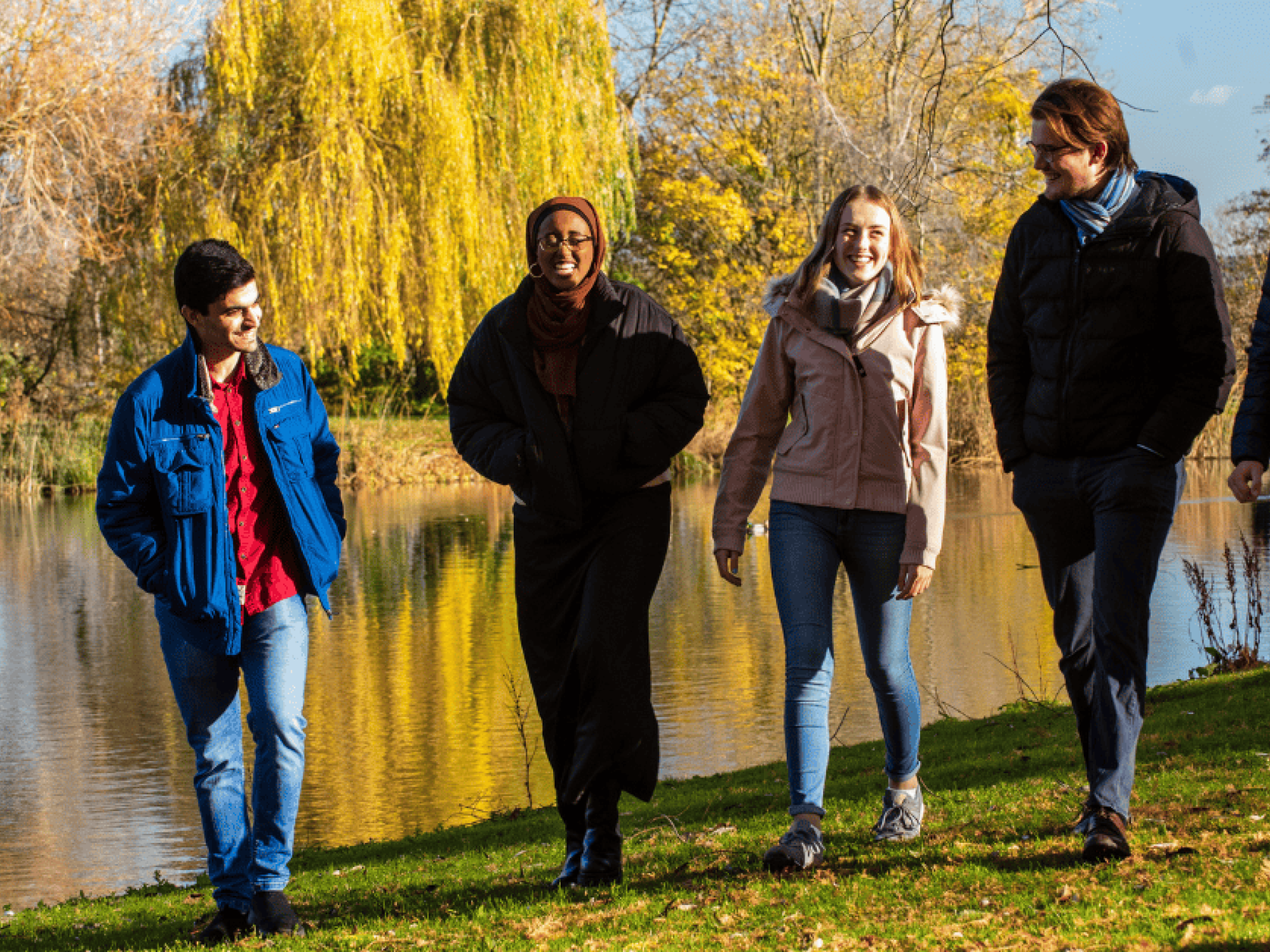
- Environment and Sustainability
BSc (Hons) — 2026 entry Environment and Sustainability
Our BSc Environment and Sustainability degree will provide you with a comprehensive understanding of environmental issues, sustainability themes and the skills needed to address complex challenges related to the environment.
Why choose
this course?
Environment and sustainability degrees are growing in popularity in both the UK and rest of the world.
With our degree in sustainability you'll gain the interdisciplinary skills to tackle the challenges faced by individuals, companies and society in implementing sustainable development. Can multinational businesses combine long-term sustainability with profitability? Will the transition to clean energy be defeated by a lack of suitable infrastructure and the policy to implement it? Addressing the challenges facing sustainable development from an interdisciplinary perspective is a key focus of this BSc.
This course is run by our internationally renowned Centre for Environment and Sustainability (CES) and the Institute for Sustainability, and in partnership with the new Surrey CIFAL – a United Nations Institute for Training and Research (UNITAR) training centre recently established at the University of Surrey. You can also take the opportunity to get industry-ready with our award-winning Professional Training placements.
Professor Gary Kass, Vice-President, Institution of Environmental Sciences, and Former Deputy Chief Scientist, Natural England, says: "This course is vital for anyone who wishes to develop the knowledge skills and mindsets necessary to make progress on sustainable development."
Statistics
11th in the UK
The University of Surrey is ranked 11th for overall student satisfaction* in the National Student Survey 2024
96%
Of Surrey graduates are in work or further education (Graduate Outcomes 2024, HESA)
*Measured by % positivity based on Q1-24 for all institutions listed in the Guardian University Guide league tables.
Accreditation



Quote
“ I highly recommend the University of Surrey's BSc Environment and Sustainability programme to those considering a career addressing the twin challenges of climate change and nature loss. The course will support students in achieving an excellent level of academic rigour blended with insights from practical experience; these skills are essential in delivering nature based solutions to modern societal challenges. ”
What you will study
In Year 1, modules will focus on core environmental science, climate change, environmental economics, sustainable development and research methods. There is also a residential fieldwork module focused on the sustainable regeneration of environments and communities.
In Years 2 and 3, the focus is on developing interdisciplinary perspectives and skills, so you’ll take a range of modules in other subject areas, including law, politics and psychology. You’ll also take modules taught by the Centre for Environment and Sustainability (CES) to continue to develop your core sustainability knowledge and research skills before undertaking a dissertation. For your dissertation you’ll conduct in-depth research into a specific environment or sustainability problem under the guidance of a dissertation supervisor.
With modules drawn from across the University and core CES teaching staff from a diverse range of disciplinary backgrounds, this course will give you the skill set needed to tackle the complex sustainability challenges of the twenty-first century.
Professional recognition
BSc (Hons) - Institution of Environmental Sciences (IES)
Accredited by the Institution of Environmental Sciences (IES) for the purpose of eligibility to apply for associate membership.
The academic year is divided into two semesters of 15 weeks each. Each semester consists of a period of teaching, revision/directed learning and assessment.
The structure of our programmes follow clear educational aims that are tailored to each programme. These are all outlined in the programme specifications which include further details such as the learning outcomes.
Please note: The full module listing for the optional Professional Training placement part of your course is available in the relevant programme specification.
Modules
Modules listed are indicative, reflecting the information available at the time of publication. Modules are subject to teaching availability, student demand and/or class size caps.
The University operates a credit framework for all taught programmes based on a 15-credit tariff.
Course options
Year 1 - BSc (Hons)
Semester 1
Compulsory
This module introduces students to the concept of sustainable development, the United Nations Sustainable Development Goals (SDGs) and the indicators adopted to measure progress toward fulfilling the goals. The module introduces students to the concept of system thinking and explores how system thinking is connected to sustainable development. It also introduces students to the use of academic literature and academic referencing.
View full module detailsThis module introduces basic macro and micro economic theory. Students are then introduced to environmental economics - the allocation of environmental resources under conditions of scarcity and market failure. The module also introduces students to ecological economics – that is an economics grounded in ecological realities - and situates these in the context of current debates about economics and sustainable development. This module builds on the concepts of national development, economic and social progress, and economic welfare which were covered in the An Unequal Planet module and strengthens students’ understanding of how the economy functions and interacts with the environment. This module is taught on an intensive basis, with classes running over a three / four week period. This intensive teaching format facilitates learning by allowing the student to really focus on the module content. It also assists with cohort development as students work closely together on collaborative tasks that develop their understanding of sustainable development challenges.
View full module detailsThis module introduces students to global environmental change from a systems perspective. It brings together physical science and social science perspectives to analyse the dynamic interactions of the Earth’s integrated systems – the atmosphere, lithosphere, hydrosphere and biosphere. It introduces students to the concept of a “safe operating space” for humanity. This module is taught on an intensive basis, with classes running over a three / four week period. This intensive teaching format facilitates deep learning by allowing the student to focus on the module content.
View full module detailsThis module examines different approaches to defining and assessing inequality and poverty, global stratification and international development processes. Different theories of national development are considered along with processes such as migration, globalisation, international aid and investment. The module also looks at inequality within the UK. Greater equality is fundamental to achieving sustainable development. This module is taught on an intensive basis, with classes running over a three / four week period. This intensive teaching format facilitates learning by allowing the student to really focus on the module content. It also assists with cohort development as students work closely together on collaborative tasks that develop their understanding of sustainable development challenges.
View full module detailsSemester 2
Compulsory
This module explores the experience of environments and communities undergoing regeneration. It examines the evolving way land is used by a society over time. The module includes case studies of urban and rural regeneration schemes in the UK. It reviews policies, planning mechanisms and practices which shape regeneration processes. The module includes a five day residential field trip in southern England and/or Wales. This module is taught on an intensive basis, with classes running over a three / four week period. This intensive teaching format facilitates learning by allowing the student to focus on the module content. It also assists with cohort development as students work closely together on collaborative tasks that develop their understanding of sustainable development challenges.
View full module detailsThis module introduces students to the use of remote sensing data and geographical information systems to support the analysis of the natural and built environment. Remote sensing techniques allow the derivation of a wide range of spatial data while geographical information systems provide the tools for analysing spatial data. This module introduces the theory and practice of geographical information systems and remote sensing, providing practical training in the use of geographical information systems. This module is taught on an intensive basis, with classes running over a three / four week period. This intensive teaching format facilitates learning by allowing the student to really focus on the module content. It also assists with cohort development as students work closely together on collaborative tasks that develop their understanding of sustainable development challenges. GIS skills and techniques learnt in this module may be used in subsequent modules such as the Sustainable housing and communities: Multi-national project, and the Dissertation by extending the range of data students can use to support their analyses in these modules.
View full module detailsThis module introduces students to the concept of inter-disciplinarity and research methods used to understand human societies and their interaction with the environment. Via a series of sustainability related case studies, students are introduced to a range of research methods such as semi-structured interviews, focus groups, and participant and non-participant observation. Students can use research methods learnt in this module in subsequent modules and their dissertation for data gathering and data analysis. In addition to learning about and applying a range of research methods in this module, students are introduced to the broader process of planning and conducting research, and the issues which need to be considered when planning data collection for research. This includes consideration of research ethics when doing field work and data collection to ensure the welfare of research subjects. It also includes consideration of intercultural differences when planning and conducting social research to ensure that any data collected is representative of the wider population. As part of digital skills development, students are taught the importance of adopting good data management practices in order to compile with General Data Protection Regulation (GDPR) rules. Towards the end of the module the concept of interdisciplinarity, which was introduced at the start of the module, is reassessed as students consider the practical implications of working across disciplines, such as dealing with different disciplinary perspectives and epistemological frameworks, disciplinary-specific use of language, and the referencing systems used by different disciplines. As part of this focus on interdisciplinarity, students will be introduced to the concept of developing a learning and continuing professional development (CPD) portfolio. Students will be encouraged to start creating a CPD portfolio which can be continuously expanded and updated as they progress through the BSc degree and then during professional careers. This portfolio can include formative and summative assessments and short reflections on these assessments from across the spectrum of modules taken, as well as other learning activities, such as site visits, short training courses, workshops and conferences attended. After graduation this portfolio can continue to be updated and expanded to include all CPD and professional work activities and be used to demonstrate achieving the requirements for full membership of professional bodies such as the Institute of Environmental Management and Assessment or the Institution of Environmental Sciences, and Chartered Environmentalist or Chartered Scientist status.
View full module detailsThis module provides an overview of global climate change and its impact on human societies and the environment. The science underpinning our understanding of climate change is reviewed along with the policy responses adopted by governments, corporations, non-governmental organisations, and individuals. While the issue of climate change was briefly examined as one of the SDGs (Climate Action) in the Sustainable Development Goals and Indicators module, this module explores the issue of climate change in much greater depth, examining climate science, the impacts of climate change on societies, and the policy response to climate change. This module is taught on an intensive basis, with classes running over a three / four week period. This intensive teaching format facilitates learning by allowing the student to really focus on the module content. It also assists with cohort development as students work closely together on collaborative tasks that develop their understanding of sustainable development challenges.
View full module detailsYear 2 - BSc (Hons)
Semester 1
Compulsory
This module will require students to engage and refine key skills developed in the first year of their degree and to apply those skills at a more advanced level. The key skills include legal research (including using digital research tools), case reading, critical thinking and analysis, precision in the use of language, effective and accurate communication, and time management. This course aims to develop a knowledge of the principles of environmental law together with a critical awareness of societal context, legal policy, enforcement and jurisprudential issues which shape this area of law. It will enable students to grasp the key characteristics of environmental law in action. They will be able to handle complex problems of pollution of the environment involving corporate and private interests. The contextual relationship between national environmental law, international law and European Union law will be understood. They will also have an understanding of the issues for the protection of the environment in developing countries
View full module detailsThis module builds on Understanding sustainability: Methods, tools and skills 1 and further develops students’ knowledge and experience of the research methods used to gain understanding of human society and its interaction with the environment. Via a case study approach, students are introduced to a range of research methods including surveys and questionnaire design. Students will gain experience in designing, collecting, producing, and analysing their own research data on case studies relating to sustainable development. The questionnaires students design will be required to demonstrate research ethics and other considerations, such as potential cultural differences amongst research subjects and compilance with General Data Protection Regulation (GDPR) rules as introduced in the Understanding sustainability: Methods, tools and skills 1 module. This module introduces students to quantitative data analysis and the use of SPSS and R. Students can use research methods learnt in this module in subsequent modules and their dissertation for data gathering and data analysis.
View full module detailsThis module explores environmental impact methodologies, legislation, processes, and practices. This module is crafted to enhance students' understanding of various environmental assessment types including environmental impact assessment, strategic environmental assessment, and sustainability reporting, through a blend of theoretical knowledge and practical applications. Students will collect ground data and assess the existing data on air, water, and noise pollution, and identify areas of high environmental stress through spatial and temporal data for real-world environmental problem-solving. The module aims to equip students with the skills necessary to conduct detailed environmental assessments and develop effective sustainability strategies, making use of cutting-edge technology to analyse and mitigate human impacts on the environment. This course is vital for those aspiring to careers in environmental planning, policy making, and conservation, providing students with the tools to make data-driven decisions and recommendations.
View full module detailsThis module examines the relationship between the media and sustainability and the environment. The media does not simply present the global challenges humans face when implementing sustainable development but actively shapes public understanding of sustainable development and motivation for change through its presentation of key issues. With environment and sustainability increasingly politicised, it is important to critically reflect on the role played by the media in shaping public understanding of sustainability science. The media is increasingly fragmented as people now draw upon a diverse range of media sources for information on contemporary events and issues. Sustainability practitioners need an understanding of how different forms of media work. Some sustainability careers depend upon effective use of social media for raising public awareness and campaigning purposes. In this module students will plan a hypothetical social media campaign on a sustainability related case study or issue.
View full module detailsSemester 2
Compulsory
Consumption is not only essential for survival but is an integral part of everyday life important for individual and group identity, relationships and the performance of social practices. However, the environmental and social consequences of the scale of contemporary consumption cannot be ignored. This module introduces students to a range of theoretical approaches which they apply to understand everyday consumption (of food, clothes, household objects, technology and energy) sociologically. It encourages them to locate their own consumption within its global environmental and social consequences, and to think critically about pathways to more sustainable modes of consumption.
View full module detailsThe form of globalisation that has characterised the international system over the post-Cold War era, a phenomenon that both drives and is driven by international institutions, treaties and regimes, is seemingly reducing the capacity of nation-states to respond to pressures emanating from the international economic and security environment. Economic challenges, including the recent global recession, require intimate cross-border cooperation (at the regional and global level); climate change presents a threat that requires urgent global-cooperation (be it between local authorities and cities in different national contexts, or at the national level), and public health continues to have drastic impacts on economy, development, and wellbeing that reach beyond individual states. Furthermore, the end of the Cold War has ushered in a host of new security challenges that states are unable to tackle on an individual basis, from preventing and dealing with the consequences of state failure, international terrorism and crime, as well as the proliferation of weapons of mass destruction. A key question that the module will examine is the extent to which these challenges are leading to a shift away from an international system characterized by the notion of state sovereignty and the control of policy development and implementation by the central political authority of the nation-state, to a diffusion of power and competencies, both ‘horizontally’, to private actors such as NGOs and Transnational Corporations, and ‘vertically’, downwards to the regional level and upwards to international organisations. The module will critically assess the analytical leverage that can be attained to these questions through the application of diverse perspectives within IR theories, covering not only realist, liberal, and constructivist schools of thought, but also critical approaches such as Marxism and post-structuralism. It will also focus on approaches drawn from political science theory, notably the literatures on multi-level governance, public policy theories, and the ‘new’ institutionalism. In the course students will tackle a number of contemporary debates on international organisations that are central to public debate - the meaning and forms of international organisations, issues of authority, power and legitimacy; how states and non-state actors (particularly NGOs and business) have shaped the nature and scope of international cooperation and the effects that participation in international institutions upon policy-making, styles of governance and institutional configuration at the national and sub-national levels. We will also examine not only the role of hegemonic powers, in particular the impact of the United States over the post-war and post-Cold War eras, but also the implications of the rise of new powers such as China and India upon international organisations. The module will then examine relevant case studies: environmental governance; global health governance; the WTO and the governance of international trade; the IMF, World Bank and the governance of finance and development; the United Nations and security governance. The module will conclude by assessing the implications of the growth of international organisations for the role of the state as a national and international actor.
View full module detailsThis module brings students together from the University of Surrey and a foreign university to tackle an environment or sustainability problem. Students will discuss, investigate and analyse the problem through an interdisciplinary approach in a multi-national project team.
View full module detailsOptional
This module considers the place of both plants and animals in the environment, looking at the dynamics of organisms within an ecosystem and role that disturbance and succession play in the evolution of ecosystems. It then develops the basic theoretical and practical skills required for their sampling, monitoring and reporting.
View full module detailsThis module will introduce students to the study of environmental crime. It will examine a wide range of issues related to the damaging relationship between humans and the ecological world. It will include a detailed examination of specific topics such as climate change, corporate environmental crime, threats to biodiversity and waste crime. Additionally, key theoretical debates surrounding the legal notions of harms against the environment and the classification of non-humans as victims of crime will be discussed. Students will be introduced to a range of approaches to policing different types of environmental crimes and the legal, financial and practical problems these present for governments and enforcement agencies.
View full module detailsOptional modules for Year 2 - FHEQ Level 5
Select one optional module in Semester 2
Year 3 - BSc (Hons)
Semester 1
Compulsory
This module is centred on a week-long field trip which explores the product life cycle of some case study consumer products which are followed from cradle to grave - ie. field or mine, to the factory, to the retailer, to the consumer and then disposal back to the environment. Drawing on insights gained during the field trip, students critically reflect on the extent to which life cycle thinking and circular economy approaches can increase the sustainability of consumption.
View full module detailsWhat is international order in the twenty first century? A few short decades have transformed the planet in ways that are only just being understood. A satellite image of the sky at night reveals coastal mega¿cities and inland urban corridors of unprecedented size and scope: new global city networks, mega-city regions and urban corridors have emerged that bring into question traditional state-centric notions of global politics. Alongside and through these urban patterns run other large technical systems: huge materially integrated physical structures: transport systems, supply chains, air travel networks, submarine Internet cables, satellites, research labs. Onto these systems now map planetary-scaled technologies of computation, generating a new mega-structure comprising smart grids, cloud computing platforms, and sensor nets. This is world order in the twenty first century. Conflict over these infrastructures is part of geopolitical competition and international order building today. This module builds on cutting edge social theory to introduce students to new ideas about how political order is built at multiple scales. It examines the ways in which China is using infrastructure investment to reshape the Eurasian political and economic order via its Belt and Road Initiative, and how the EU and the US are responding. It examines how global city networks are setting their own global governance agendas, often in parallel to states. It offers new perspectives on the infrastructural dark matter that holds international orders together, and allows them to endure across time and space.
View full module detailsOptional
The module introduces students to some of the key questions which currently guide research and practice in environmental psychology. The module addresses issues around architectural psychology as well as global and local environmental problems facing our world today. It provides an insight into the psychology of environment-behaviour issues focusing on built (residential, work and public) and natural environments. The main focus of the module will be to provide an insight into the research and theory development to date and to familiarise students with the practical and multidisciplinary nature of the field. By the end of the module students should have an advanced understanding of the nature and scope of some of the principal theoretical and methodological developments in this area of research and an understanding of the application of psychological theory and concepts to an important area of everyday life.
View full module detailsThe module will cover the basic elements of negotiation, using a combination of theoretical and practical methods. The module introduces theoretical approaches to negotiation, before exploring and illustrating them through active usage in a series of games and exercises. Negotiations in class (weekly) as well as online (throughout the duration of the semester) allow students to address real-life political issues in the form of simulations. The taught theoretical insights are put to practice with tailored seminar activities. More importantly, students are required to evaluate their practice in a self-reflexive critical portfolio that will be based on the experience built throughout the semester. This will test their grasp of the topic as well as give them the opportunity to consider how it will inform their future practices as a 'negotiator' within employment.
View full module detailsThis module considers the negative impacts of humans on the environment and ways to mitigate these for a sustainable future.
View full module detailsSemester 2
Optional
The purpose of the module is to provide a detailed theoretical knowledge of Food, Water and Soil Security in order to improve the provision of safe food components and commodities that have high nutritional and ecological quality. In this respect, the analysis of foods and farming & processing methods that meet UK and EU Food Legislation and associated guidelines is examined. In addition, this module covers aspects related to Farm Production, Food Fraud and Food Safety, particularly in the area of animal welfare, animal species adulteration and food-borne diseases. Students will also appreciate the importance of carrying out appropriate risk assessment for further implementation of HACCP and control methods in the food industry. The module comprises lectures, tutorials and assessments that form an essential part of the Food Science and Nutrition (BD46) degree. It is also highly recommended to students doing Nutrition, Dietetics or the Veterinary Biosciences degree.
View full module detailsThis module provides students with both a theoretical and practical understanding of International Trade, considered from an international political economy (IPE) perspective. This is done through the assessment of International Trade from different angles, predominantly from the state’s perspective, the international trade regime perspective (the GATT and WTO) as well as from the perspectives of regional cooperation and of business and industry
View full module detailsThe module provides insight into the key challenges faced by transportation engineers in seeking to design, deliver and maintain sustainable transportation systems. Transport is placed in the context of sustainability and urban living. Thus addressing the positive and negative impacts of transport with respect to the economy, society and the environment. The module addresses passenger and freight transportation covering the main modes of road, rail, water, air and pipeline and does this in the context of sustainability and ways of prioritising active modes of transport. Trends in society, and associated developments in transport technology will be examined in the context of future infrastructure needs and associated disruption management.
View full module detailsThe module will introduce students to key concepts in education as well as the tools and strategies for effective public engagement in their discipline areas and for different audiences. Students will gain practical experience by planning, implementing, and evaluating an education or public engagement-based activity. Opportunities will also exist for classroom (e.g. school; early-year University) teaching experience and / or involvement in external exhibitions. The projects will be related to current Faculty, department and / or outreach needs thus leading to informed student partnership activities.
View full module detailsThis course provides an opportunity to students taking all pathways to explore key topics in political science, such as: What is 'activism' in the age of social media; Who are the activists today; What are the motivations behind political activism; How do different organizational vehicles (parties, movements, NGOs, pressure groups) contribute to the functioning of democracy. The module links well to modules at Level 5 (such as POL2029 and POL2047) and at Level 6 (such as POL3081, POL3082, POL3088, POL3089).
View full module detailsSemester 1 & 2
Core
The Dissertation module provides students with an opportunity to explore a key aspect of sustainable development in depth. By applying the knowledge, skills and expertise developed in their degree in modules such as Understanding sustainability - Methods, tools and skills 1 , Understanding sustainability - Methods, tools and skills 2 and Remote sensing and GIS, students undertake original research to answer a research question or prove a hypothesis. The research process typically involves the review of the relevant literature, developing a research methodology, data collection (or acquisition of an existing data set), data analysis and reflection. Students are encouraged to apply interdisciplinary approaches in their research, thus crossing the boundaries between disciplines to address a problem which can be better understood by applying combining research approaches from more than one discipline.
View full module detailsOptional modules for Year 3 - FHEQ Level 6
Select one optional module in Semester 1 and two optional modules in semester 2.
Year 1 - BSc (Hons) with placement
Semester 1
Compulsory
This module introduces students to the concept of sustainable development, the United Nations Sustainable Development Goals (SDGs) and the indicators adopted to measure progress toward fulfilling the goals. The module introduces students to the concept of system thinking and explores how system thinking is connected to sustainable development. It also introduces students to the use of academic literature and academic referencing.
View full module detailsThis module introduces basic macro and micro economic theory. Students are then introduced to environmental economics - the allocation of environmental resources under conditions of scarcity and market failure. The module also introduces students to ecological economics – that is an economics grounded in ecological realities - and situates these in the context of current debates about economics and sustainable development. This module builds on the concepts of national development, economic and social progress, and economic welfare which were covered in the An Unequal Planet module and strengthens students’ understanding of how the economy functions and interacts with the environment. This module is taught on an intensive basis, with classes running over a three / four week period. This intensive teaching format facilitates learning by allowing the student to really focus on the module content. It also assists with cohort development as students work closely together on collaborative tasks that develop their understanding of sustainable development challenges.
View full module detailsThis module introduces students to global environmental change from a systems perspective. It brings together physical science and social science perspectives to analyse the dynamic interactions of the Earth’s integrated systems – the atmosphere, lithosphere, hydrosphere and biosphere. It introduces students to the concept of a “safe operating space” for humanity. This module is taught on an intensive basis, with classes running over a three / four week period. This intensive teaching format facilitates deep learning by allowing the student to focus on the module content.
View full module detailsThis module examines different approaches to defining and assessing inequality and poverty, global stratification and international development processes. Different theories of national development are considered along with processes such as migration, globalisation, international aid and investment. The module also looks at inequality within the UK. Greater equality is fundamental to achieving sustainable development. This module is taught on an intensive basis, with classes running over a three / four week period. This intensive teaching format facilitates learning by allowing the student to really focus on the module content. It also assists with cohort development as students work closely together on collaborative tasks that develop their understanding of sustainable development challenges.
View full module detailsSemester 2
Compulsory
This module explores the experience of environments and communities undergoing regeneration. It examines the evolving way land is used by a society over time. The module includes case studies of urban and rural regeneration schemes in the UK. It reviews policies, planning mechanisms and practices which shape regeneration processes. The module includes a five day residential field trip in southern England and/or Wales. This module is taught on an intensive basis, with classes running over a three / four week period. This intensive teaching format facilitates learning by allowing the student to focus on the module content. It also assists with cohort development as students work closely together on collaborative tasks that develop their understanding of sustainable development challenges.
View full module detailsThis module introduces students to the use of remote sensing data and geographical information systems to support the analysis of the natural and built environment. Remote sensing techniques allow the derivation of a wide range of spatial data while geographical information systems provide the tools for analysing spatial data. This module introduces the theory and practice of geographical information systems and remote sensing, providing practical training in the use of geographical information systems. This module is taught on an intensive basis, with classes running over a three / four week period. This intensive teaching format facilitates learning by allowing the student to really focus on the module content. It also assists with cohort development as students work closely together on collaborative tasks that develop their understanding of sustainable development challenges. GIS skills and techniques learnt in this module may be used in subsequent modules such as the Sustainable housing and communities: Multi-national project, and the Dissertation by extending the range of data students can use to support their analyses in these modules.
View full module detailsThis module introduces students to the concept of inter-disciplinarity and research methods used to understand human societies and their interaction with the environment. Via a series of sustainability related case studies, students are introduced to a range of research methods such as semi-structured interviews, focus groups, and participant and non-participant observation. Students can use research methods learnt in this module in subsequent modules and their dissertation for data gathering and data analysis. In addition to learning about and applying a range of research methods in this module, students are introduced to the broader process of planning and conducting research, and the issues which need to be considered when planning data collection for research. This includes consideration of research ethics when doing field work and data collection to ensure the welfare of research subjects. It also includes consideration of intercultural differences when planning and conducting social research to ensure that any data collected is representative of the wider population. As part of digital skills development, students are taught the importance of adopting good data management practices in order to compile with General Data Protection Regulation (GDPR) rules. Towards the end of the module the concept of interdisciplinarity, which was introduced at the start of the module, is reassessed as students consider the practical implications of working across disciplines, such as dealing with different disciplinary perspectives and epistemological frameworks, disciplinary-specific use of language, and the referencing systems used by different disciplines. As part of this focus on interdisciplinarity, students will be introduced to the concept of developing a learning and continuing professional development (CPD) portfolio. Students will be encouraged to start creating a CPD portfolio which can be continuously expanded and updated as they progress through the BSc degree and then during professional careers. This portfolio can include formative and summative assessments and short reflections on these assessments from across the spectrum of modules taken, as well as other learning activities, such as site visits, short training courses, workshops and conferences attended. After graduation this portfolio can continue to be updated and expanded to include all CPD and professional work activities and be used to demonstrate achieving the requirements for full membership of professional bodies such as the Institute of Environmental Management and Assessment or the Institution of Environmental Sciences, and Chartered Environmentalist or Chartered Scientist status.
View full module detailsThis module provides an overview of global climate change and its impact on human societies and the environment. The science underpinning our understanding of climate change is reviewed along with the policy responses adopted by governments, corporations, non-governmental organisations, and individuals. While the issue of climate change was briefly examined as one of the SDGs (Climate Action) in the Sustainable Development Goals and Indicators module, this module explores the issue of climate change in much greater depth, examining climate science, the impacts of climate change on societies, and the policy response to climate change. This module is taught on an intensive basis, with classes running over a three / four week period. This intensive teaching format facilitates learning by allowing the student to really focus on the module content. It also assists with cohort development as students work closely together on collaborative tasks that develop their understanding of sustainable development challenges.
View full module detailsYear 2 - BSc (Hons) with placement
Semester 1
Compulsory
This module will require students to engage and refine key skills developed in the first year of their degree and to apply those skills at a more advanced level. The key skills include legal research (including using digital research tools), case reading, critical thinking and analysis, precision in the use of language, effective and accurate communication, and time management. This course aims to develop a knowledge of the principles of environmental law together with a critical awareness of societal context, legal policy, enforcement and jurisprudential issues which shape this area of law. It will enable students to grasp the key characteristics of environmental law in action. They will be able to handle complex problems of pollution of the environment involving corporate and private interests. The contextual relationship between national environmental law, international law and European Union law will be understood. They will also have an understanding of the issues for the protection of the environment in developing countries
View full module detailsThis module builds on Understanding sustainability: Methods, tools and skills 1 and further develops students’ knowledge and experience of the research methods used to gain understanding of human society and its interaction with the environment. Via a case study approach, students are introduced to a range of research methods including surveys and questionnaire design. Students will gain experience in designing, collecting, producing, and analysing their own research data on case studies relating to sustainable development. The questionnaires students design will be required to demonstrate research ethics and other considerations, such as potential cultural differences amongst research subjects and compilance with General Data Protection Regulation (GDPR) rules as introduced in the Understanding sustainability: Methods, tools and skills 1 module. This module introduces students to quantitative data analysis and the use of SPSS and R. Students can use research methods learnt in this module in subsequent modules and their dissertation for data gathering and data analysis.
View full module detailsThis module explores environmental impact methodologies, legislation, processes, and practices. This module is crafted to enhance students' understanding of various environmental assessment types including environmental impact assessment, strategic environmental assessment, and sustainability reporting, through a blend of theoretical knowledge and practical applications. Students will collect ground data and assess the existing data on air, water, and noise pollution, and identify areas of high environmental stress through spatial and temporal data for real-world environmental problem-solving. The module aims to equip students with the skills necessary to conduct detailed environmental assessments and develop effective sustainability strategies, making use of cutting-edge technology to analyse and mitigate human impacts on the environment. This course is vital for those aspiring to careers in environmental planning, policy making, and conservation, providing students with the tools to make data-driven decisions and recommendations.
View full module detailsThis module examines the relationship between the media and sustainability and the environment. The media does not simply present the global challenges humans face when implementing sustainable development but actively shapes public understanding of sustainable development and motivation for change through its presentation of key issues. With environment and sustainability increasingly politicised, it is important to critically reflect on the role played by the media in shaping public understanding of sustainability science. The media is increasingly fragmented as people now draw upon a diverse range of media sources for information on contemporary events and issues. Sustainability practitioners need an understanding of how different forms of media work. Some sustainability careers depend upon effective use of social media for raising public awareness and campaigning purposes. In this module students will plan a hypothetical social media campaign on a sustainability related case study or issue.
View full module detailsSemester 2
Compulsory
Consumption is not only essential for survival but is an integral part of everyday life important for individual and group identity, relationships and the performance of social practices. However, the environmental and social consequences of the scale of contemporary consumption cannot be ignored. This module introduces students to a range of theoretical approaches which they apply to understand everyday consumption (of food, clothes, household objects, technology and energy) sociologically. It encourages them to locate their own consumption within its global environmental and social consequences, and to think critically about pathways to more sustainable modes of consumption.
View full module detailsThe form of globalisation that has characterised the international system over the post-Cold War era, a phenomenon that both drives and is driven by international institutions, treaties and regimes, is seemingly reducing the capacity of nation-states to respond to pressures emanating from the international economic and security environment. Economic challenges, including the recent global recession, require intimate cross-border cooperation (at the regional and global level); climate change presents a threat that requires urgent global-cooperation (be it between local authorities and cities in different national contexts, or at the national level), and public health continues to have drastic impacts on economy, development, and wellbeing that reach beyond individual states. Furthermore, the end of the Cold War has ushered in a host of new security challenges that states are unable to tackle on an individual basis, from preventing and dealing with the consequences of state failure, international terrorism and crime, as well as the proliferation of weapons of mass destruction. A key question that the module will examine is the extent to which these challenges are leading to a shift away from an international system characterized by the notion of state sovereignty and the control of policy development and implementation by the central political authority of the nation-state, to a diffusion of power and competencies, both ‘horizontally’, to private actors such as NGOs and Transnational Corporations, and ‘vertically’, downwards to the regional level and upwards to international organisations. The module will critically assess the analytical leverage that can be attained to these questions through the application of diverse perspectives within IR theories, covering not only realist, liberal, and constructivist schools of thought, but also critical approaches such as Marxism and post-structuralism. It will also focus on approaches drawn from political science theory, notably the literatures on multi-level governance, public policy theories, and the ‘new’ institutionalism. In the course students will tackle a number of contemporary debates on international organisations that are central to public debate - the meaning and forms of international organisations, issues of authority, power and legitimacy; how states and non-state actors (particularly NGOs and business) have shaped the nature and scope of international cooperation and the effects that participation in international institutions upon policy-making, styles of governance and institutional configuration at the national and sub-national levels. We will also examine not only the role of hegemonic powers, in particular the impact of the United States over the post-war and post-Cold War eras, but also the implications of the rise of new powers such as China and India upon international organisations. The module will then examine relevant case studies: environmental governance; global health governance; the WTO and the governance of international trade; the IMF, World Bank and the governance of finance and development; the United Nations and security governance. The module will conclude by assessing the implications of the growth of international organisations for the role of the state as a national and international actor.
View full module detailsThis module brings students together from the University of Surrey and a foreign university to tackle an environment or sustainability problem. Students will discuss, investigate and analyse the problem through an interdisciplinary approach in a multi-national project team.
View full module detailsOptional
This module considers the place of both plants and animals in the environment, looking at the dynamics of organisms within an ecosystem and role that disturbance and succession play in the evolution of ecosystems. It then develops the basic theoretical and practical skills required for their sampling, monitoring and reporting.
View full module detailsThis module will introduce students to the study of environmental crime. It will examine a wide range of issues related to the damaging relationship between humans and the ecological world. It will include a detailed examination of specific topics such as climate change, corporate environmental crime, threats to biodiversity and waste crime. Additionally, key theoretical debates surrounding the legal notions of harms against the environment and the classification of non-humans as victims of crime will be discussed. Students will be introduced to a range of approaches to policing different types of environmental crimes and the legal, financial and practical problems these present for governments and enforcement agencies.
View full module detailsOptional modules for Year 2 (with PTY) - FHEQ Level 5
Select one optional module in Semester 2
Year 3 - BSc (Hons) with placement
Semester 1
Compulsory
This module is centred on a week-long field trip which explores the product life cycle of some case study consumer products which are followed from cradle to grave - ie. field or mine, to the factory, to the retailer, to the consumer and then disposal back to the environment. Drawing on insights gained during the field trip, students critically reflect on the extent to which life cycle thinking and circular economy approaches can increase the sustainability of consumption.
View full module detailsWhat is international order in the twenty first century? A few short decades have transformed the planet in ways that are only just being understood. A satellite image of the sky at night reveals coastal mega¿cities and inland urban corridors of unprecedented size and scope: new global city networks, mega-city regions and urban corridors have emerged that bring into question traditional state-centric notions of global politics. Alongside and through these urban patterns run other large technical systems: huge materially integrated physical structures: transport systems, supply chains, air travel networks, submarine Internet cables, satellites, research labs. Onto these systems now map planetary-scaled technologies of computation, generating a new mega-structure comprising smart grids, cloud computing platforms, and sensor nets. This is world order in the twenty first century. Conflict over these infrastructures is part of geopolitical competition and international order building today. This module builds on cutting edge social theory to introduce students to new ideas about how political order is built at multiple scales. It examines the ways in which China is using infrastructure investment to reshape the Eurasian political and economic order via its Belt and Road Initiative, and how the EU and the US are responding. It examines how global city networks are setting their own global governance agendas, often in parallel to states. It offers new perspectives on the infrastructural dark matter that holds international orders together, and allows them to endure across time and space.
View full module detailsOptional
The module introduces students to some of the key questions which currently guide research and practice in environmental psychology. The module addresses issues around architectural psychology as well as global and local environmental problems facing our world today. It provides an insight into the psychology of environment-behaviour issues focusing on built (residential, work and public) and natural environments. The main focus of the module will be to provide an insight into the research and theory development to date and to familiarise students with the practical and multidisciplinary nature of the field. By the end of the module students should have an advanced understanding of the nature and scope of some of the principal theoretical and methodological developments in this area of research and an understanding of the application of psychological theory and concepts to an important area of everyday life.
View full module detailsThe module will cover the basic elements of negotiation, using a combination of theoretical and practical methods. The module introduces theoretical approaches to negotiation, before exploring and illustrating them through active usage in a series of games and exercises. Negotiations in class (weekly) as well as online (throughout the duration of the semester) allow students to address real-life political issues in the form of simulations. The taught theoretical insights are put to practice with tailored seminar activities. More importantly, students are required to evaluate their practice in a self-reflexive critical portfolio that will be based on the experience built throughout the semester. This will test their grasp of the topic as well as give them the opportunity to consider how it will inform their future practices as a 'negotiator' within employment.
View full module detailsThis module considers the negative impacts of humans on the environment and ways to mitigate these for a sustainable future.
View full module detailsSemester 2
Optional
The purpose of the module is to provide a detailed theoretical knowledge of Food, Water and Soil Security in order to improve the provision of safe food components and commodities that have high nutritional and ecological quality. In this respect, the analysis of foods and farming & processing methods that meet UK and EU Food Legislation and associated guidelines is examined. In addition, this module covers aspects related to Farm Production, Food Fraud and Food Safety, particularly in the area of animal welfare, animal species adulteration and food-borne diseases. Students will also appreciate the importance of carrying out appropriate risk assessment for further implementation of HACCP and control methods in the food industry. The module comprises lectures, tutorials and assessments that form an essential part of the Food Science and Nutrition (BD46) degree. It is also highly recommended to students doing Nutrition, Dietetics or the Veterinary Biosciences degree.
View full module detailsThis module provides students with both a theoretical and practical understanding of International Trade, considered from an international political economy (IPE) perspective. This is done through the assessment of International Trade from different angles, predominantly from the state’s perspective, the international trade regime perspective (the GATT and WTO) as well as from the perspectives of regional cooperation and of business and industry
View full module detailsThe module provides insight into the key challenges faced by transportation engineers in seeking to design, deliver and maintain sustainable transportation systems. Transport is placed in the context of sustainability and urban living. Thus addressing the positive and negative impacts of transport with respect to the economy, society and the environment. The module addresses passenger and freight transportation covering the main modes of road, rail, water, air and pipeline and does this in the context of sustainability and ways of prioritising active modes of transport. Trends in society, and associated developments in transport technology will be examined in the context of future infrastructure needs and associated disruption management.
View full module detailsThe module will introduce students to key concepts in education as well as the tools and strategies for effective public engagement in their discipline areas and for different audiences. Students will gain practical experience by planning, implementing, and evaluating an education or public engagement-based activity. Opportunities will also exist for classroom (e.g. school; early-year University) teaching experience and / or involvement in external exhibitions. The projects will be related to current Faculty, department and / or outreach needs thus leading to informed student partnership activities.
View full module detailsThis course provides an opportunity to students taking all pathways to explore key topics in political science, such as: What is 'activism' in the age of social media; Who are the activists today; What are the motivations behind political activism; How do different organizational vehicles (parties, movements, NGOs, pressure groups) contribute to the functioning of democracy. The module links well to modules at Level 5 (such as POL2029 and POL2047) and at Level 6 (such as POL3081, POL3082, POL3088, POL3089).
View full module detailsSemester 1 & 2
Core
The Dissertation module provides students with an opportunity to explore a key aspect of sustainable development in depth. By applying the knowledge, skills and expertise developed in their degree in modules such as Understanding sustainability - Methods, tools and skills 1 , Understanding sustainability - Methods, tools and skills 2 and Remote sensing and GIS, students undertake original research to answer a research question or prove a hypothesis. The research process typically involves the review of the relevant literature, developing a research methodology, data collection (or acquisition of an existing data set), data analysis and reflection. Students are encouraged to apply interdisciplinary approaches in their research, thus crossing the boundaries between disciplines to address a problem which can be better understood by applying combining research approaches from more than one discipline.
View full module detailsOptional modules for Year 3 (with PTY) - FHEQ Level 6
Select one optional module in Semester 1 and two optional modules in semester 2.
Professional Training Year (PTY)
Semester 1 & 2
Core
This module supports students' development of personal and professional attitudes and abilities appropriate to a Professional Training placement. It supports and facilitates self-reflection and transfer of learning from student's Professional Training placement experiences to their final year of study and their future employment. The PTY module is concerned with Personal and Professional Development towards holistic academic and non-academic learning and is a process that involves self-reflection. Development and learning may occur before and during the placement, and this is reflected in the assessment model as a progressive process. However, the graded assessment takes place primarily towards the end of the placement. Additionally, the module aims to enable students to evidence and evaluate their placement experiences and transfer that learning to other situations through written skills.
View full module detailsThis module supports students' development of personal and professional attitudes and abilities appropriate to a Professional Training placement. It supports and facilitates self-reflection and transfer of learning from student's Professional Training placement experiences to their final year of study and their future employment. The PTY module is concerned with Personal and Professional Development towards holistic academic and non-academic learning, and is a process that involves self-reflection, documented via the creation of a personal record, planning and monitoring progress towards the achievement of personal objectives. Development and learning may occur before and during the placement, and this is reflected in the assessment model as a progressive process. However, the graded assessment takes place primarily towards the end of the placement. Additionally, the module aims to enable students to evidence and evaluate their placement experiences and transfer that learning to other situations through written and presentation skills.
View full module detailsThis module supports students' development of personal and professional attitudes and abilities appropriate to a Professional Training placement. It supports and facilitates self-reflection and transfer of learning from a student's Professional Training placement experiences to their final year of study and their future employment. The PTY module is concerned with Personal and Professional Development towards holistic academic and non-academic learning, and is a process that involves self-reflection, documented via the creation of a personal record, planning and monitoring progress towards the achievement of personal objectives. Development and learning may occur before and during the placement, and this is reflected in the assessment model as a progressive process. However, the graded assessment takes place primarily towards the end of the placement. Additionally, the module aims to enable students to evidence and evaluate their placement experiences and transfer that learning to other situations through written skills. In the year prior to the Professional Training Year (FHEQ 5) some seminars will be provided to students by alumni about their experiences working in industry. These seminars will help students prepare for their Professional Training year by helping set expectations about working in the environment and sustainability jobs and the wider sector.
View full module detailsTeaching and learning
You’ll be taught by CES academics, who have experience in academia, industry and the public sector. Their research interests and industry experience includes:
- Clean energy and clean technology
- Consumption and production
- Corporate environmental behaviour
- Life cycle assessment
- Policy development
- Sociology of the environment
- Sustainable prosperity
- Vertical farming
- Water and sanitation.
In addition, you’ll be taught by tutors from other departments in the University who work at the interface between their core discipline and sustainability.
Respected names from academia, industry or the public sector give regular talks to our students. Recent participants include Professor Tim Jackson, author of Prosperity without Growth. Corporate leaders from Marks & Spencer, Aviva Investors, Costain Group, LC Energy and the NHS have also participated as guest lecturers at the MSc level in the past couple of years.
We hold a regular series of seminars where external speakers discuss sustainability issues with our students.
- Lectures
- Group work
- Independent study
- Online learning
- Role play
- Seminars
- Trips
- Tutorials
Assessment
We use a variety of methods to assess you, including:
- Coursework
- Essays
- Examinations
- Presentations.
General course information
Contact hours
Contact hours can vary across our modules. Full details of the contact hours for each module are available from the University of Surrey's module catalogue. See the modules section for more information.
Timetable
New students will receive their personalised timetable in Welcome Week. In later semesters, two weeks before the start of semester.
Scheduled teaching can take place on any day of the week (Monday – Friday), with part-time classes normally scheduled on one or two days. Wednesday afternoons tend to be for sports and cultural activities.
View our code of practice for the scheduling of teaching and assessment (PDF) for more information.
Location
This course is based at Stag Hill campus. Stag Hill is the University's main campus and where the majority of our courses are taught.
We offer careers information, advice and guidance to all students whilst studying with us, which is extended to our alumni for three years after leaving the University.
We have strong links with research, industry and the public sector. A bachelor's degree in sustainability provides you with a wealth of employment opportunities once you graduate - our recent graduates have gone on to roles including:
- Sustainability Consultant at Worldrise Onlus
- Environmental and Sustainability Coordinator at Michael J Lonsdale
- Sustainability Coordinator at Coats
- Ecology and Environment Consultant, Biosphere Conservation Consulting Services
- Certification Analyst at Climate Bonds Initiative
- Consulting Analyst at TrueCue
- Senior Environmental and Sustainability Engineer at Frazer-Nash
- Environmental Projects Assistant at ThamesWey group
- Climate Change Officer at Bassetlaw District Council
- Associate, Sustainability and Climate Change at PwC
- Recycled Materials Broker at Newport Recycling
- Manager, Programme Development and Compliance at the Green Building Initiative.
Progress onto a masters course
Graduates also have the option to continue their education and engage in masters-level study on one of our MSc courses:


Abigail S.
Student - Environmental and Sustainability BSc (Hons)
"One aspect I love about the Environment and Sustainability course is the multidisciplinary topics connecting science, policies, and everyday behaviours. It teaches not only about actionable change but also complex Earth systems."


Ananya Khandelwal
Student - BSc Environment and Sustainability
The interactive nature of our classes encourages open discussions with our lecturers, offering a professional yet engaging approach to learning.
Learn more about the qualifications we typically accept to study this course at Surrey.
Typical offer
- BSc (Hons):
- BBB.
GCSE or equivalent: English Language at grade 4 (C) and Mathematics at grade 4 (C).
- BSc (Hons):
- DDM.
GCSE or equivalent: English Language at grade 4 (C) and Mathematics at grade 4 (C).
- BSc (Hons):
- 32.
GCSE or equivalent: English A HL4/SL4 or English B HL5/SL6 and Mathematics (either course) HL4/SL4.
- BSc (Hons):
- 75%.
GCSE or equivalent: English Language (1/2) - 6 English Language (3) - 7 and Mathematics - 6.
- BSc (Hons):
- QAA recognised Access to Higher Education Diploma with 45 level 3 credits overall including 27 level 3 credits at Distinction and 18 level 3 credits at Merit.
GCSE or equivalent: English Language at grade 4 (C) and Mathematics at grade 4 (C).
- BSc (Hons):
- ABBBB.
GCSE or equivalent: Scottish National 5 in English Language and Mathematics at grade C.
- BSc (Hons):
- Distinction overall, with minimum C in the Core Component.
- BSc (Hons) with foundation year:
- Pass overall, with minimum D in the Core Component.
GCSE or equivalent: English Language at Grade 4 (C) and Mathematics at Grade 4 (C).
Overall: BBB from a combination of the Advanced Skills Baccalaureate Wales and two A-levels.
GCSE or equivalent: English Language at grade 4 (C) and Mathematics at grade 4 (C).
English language requirements
IELTS Academic: 6.0 overall with 5.5 in each element.
View the other English language qualifications that we accept.
If you do not currently meet the level required for your programme, we offer intensive pre-sessional English language courses, designed to take you to the level of English ability and skill required for your studies here.


International Foundation Year
If you are an international student and you don’t meet the entry requirements for this degree, we offer the International Foundation Year at the Surrey International Study Centre. Upon successful completion, you can progress to this degree course.
Selection process
We normally make offers in terms of grades.
If you are a suitable candidate you will be invited to an offer holder event. During your visit to the University you can find out more about the course and meet staff and students.
Recognition of prior learning
We recognise that many students enter their higher education course with valuable knowledge and skills developed through a range of professional, vocational and community contexts.
If this applies to you, the recognition of prior learning (RPL) process may allow you to join a course without the formal entry requirements or enter your course at a point appropriate to your previous learning and experience.
There are restrictions on RPL for some courses and fees may be payable for certain claims. Please see the code of practice for recognition of prior learning and prior credit: taught programmes (PDF) for further information.
Contextual offers
Did you know eligible students receive support through their application to Surrey, which could include a grade reduction on offer?
Fees
Explore UKCISA’s website for more information if you are unsure whether you are a UK or overseas student. View the list of fees for all undergraduate courses.
Payment schedule
- Students with Tuition Fee Loan: the Student Loans Company pay fees in line with their schedule.
- Students without a Tuition Fee Loan: pay their fees either in full at the beginning of the programme or in two instalments as follows:
- 50% payable 10 days after the invoice date (expected to be early October of each academic year)
- 50% in January of the same academic year.
The exact date(s) will be on invoices. Students on part-time programmes where fees are paid on a modular basis, cannot pay fees by instalment.
- Sponsored students: must provide us with valid sponsorship information that covers the period of study.
Professional training placement fees
Professional Training placement year fees are approximately 20% of the full-time fee for the academic year in which you undertake your placement.
Additional costs
Commuting (local travel expenses): Depending on placement, students can incur travel, visa and accommodation costs.
These additional costs are accurate as of September 2024 and apply to the 2025 year of entry. Costs for 2026 entry will be published in September 2025.
Our award-winning Professional Training placement scheme gives you the chance to spend a year in industry, either in the UK or abroad.
We have thousands of placement providers to choose from, most of which offer pay. So, become one of our many students who have had their lives and career choices transformed.
Environment and sustainability placements
We offer award-winning Professional Training placements. Organisations that have participated in our courses and accepted our masters students on placements include:
- AECOM
- Aviva Investors
- Coates
- Diocese of London
- Forum for the Future
- GAP
- John Lewis Partnership
- LC Energy
- Minimise Solutions
- NUS
- Portsmouth City Council
- The Radisson
- Solar Aid
- Telefonica
- Unilever
- Wates
- World Wildlife Fund.
Applying for placements
Students are generally not placed by the University. But we offer support and guidance throughout the process, with access to a vacancy site of placement opportunities.
Find out more about the application process.


Discover, develop and dive in
Find out how students at Surrey developed their skills in industry by undertaking a placement year.
Discover, develop and dive in
Find out how students at Surrey developed their skills in industry by undertaking a placement year.
Apply for your chosen course online through UCAS, with the following course and institution codes.
About the University of Surrey
Need more information?
Contact our Admissions team or talk to a current University of Surrey student online.
Terms and conditions
When you accept an offer to study at the University of Surrey, you are agreeing to follow our policies and procedures, student regulations, and terms and conditions.
We provide these terms and conditions in two stages:
- First when we make an offer.
- Second when students accept their offer and register to study with us (registration terms and conditions will vary depending on your course and academic year).
View our generic registration terms and conditions (PDF) for the 2024/25 academic year, as a guide on what to expect.
Disclaimer
This online prospectus has been published in advance of the academic year to which it applies.
Whilst we have done everything possible to ensure this information is accurate, some changes may happen between publishing and the start of the course.
It is important to check this website for any updates before you apply for a course with us. Read our full disclaimer.





